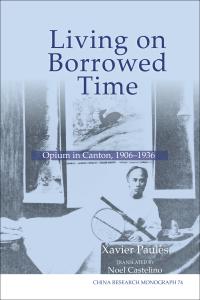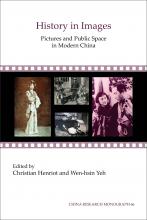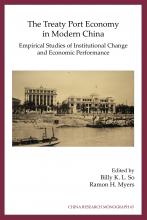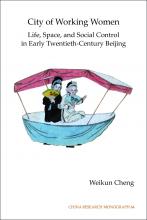Living on Borrowed Time
Living on Borrowed Time
Xavier Paulès, Noel Castelino, trans.
This comprehensive microhistory of opium in Canton from the late Qing to Republican period examines the infamous drug from the perspective of material, political, economic, and social history. Paulès traces the transformation of the drug from elite habit to national shame. Translated from the original French, Histoire d'une drogue en sursis: L'opium à Canton, 1906–1936 (EHESS, 2010).
As a nonprofit academic press, we need your support to publish our books. Your gift can help us make more of our titles available as e-books. DONATE NOW
Title information
This comprehensive microhistory of opium in Canton from the late Qing to Republican period examines the infamous drug from the perspective of material, political, economic, and social history. Paulès traces the transformation of the drug from elite habit to national shame, arguing that the marginalization of opium occurred well before 1949. This monograph covers the drug's material history and practices, the contradictory politics and economics of opium revenue, the spaces of consumption, and anti-opium propanganda that created the image of the degenerate opium smoker. Translated from the original French, Histoire d'une drogue en sursis: L'opium à Canton, 1906–1936 (EHESS, 2010).
Xavier Paulès
Xavier Paulès is the director of the Centre d'études sur la Chine moderne et contemporaine (CECMC) at the Ecole des Hautes Etudes en Science Sociales (EHESS) in Paris, France. His research focuses on the urban history of contemporary China and the history of opium and gambling. He has published in French, English, and Chinese.
Noel Castelino, trans.
Noel Castelino specializes in translations from French to English for academic publications relating to Chinese studies. His translations include Christian Henriot's Shanghai, 1927-1937 (UC Press, 1993) and Prostitution and Sexuality in Shanghai (Cambridge UP, 2001).
Living on Borrowed Time: Opium in Canton, 1906-1936 (CRM 74)
Acknowledgements
Romanization
Currency and Weights
Introduction
1. The Material and Structural History
2. Opium Eradication as a Feasible Goal, 1906-1923
3. An Indispensable Source of Revenue, 1923–1936
4. The Geography of Consumption
5. Life in the Opium Houses
6. Opium in the Collective Mind during the Republican Period: The Imperfect Victory of Propaganda
7. An X-ray of the Opium Smoker
Conclusion
Biographies
Sources and Bibliography
Index of Names and Glossary
|
JOURNAL REVIEWS |
|
“Paulès’ monograph is the most comprehensive study we have of opium’s use and meaning in a single place. It challenges our conceptual and historiographical stereotypes.” ~Blaine Chiasson, Sir Wilfrid Laurier University, in Twentieth-Century China 39, no. 3 (2014). http://dx.doi.org/10.1179/1521538514Z.00000000049 |
|
"This book by Xavier Paulès is written in a way to somewhat revise the history of the Republican era along three original lines....[U]nlike all his predecessors, Xavier Paulès is not content to study the supply of opium. He seeks to explore the demand for opium. His first chapter...contains a veritable anthropological survey of the preparation of the drug, as well as the tools used in the smoking houses, the modes of consumption, and the effects of the drug.” |
|
“The diversity of sources used, from archives to periodicals and yearbooks of Canton, permits Xavier Paulès to propose a detailed study of both the supply and demand of opium during the period studied and to provide a very innovative vision of diverse aspects of the drug.” |
|
"Joining a host of recent works on opium and urbanism in modern China, Living on Borrowed Time is a welcome contribution not only to the study of these topics, but also as a model for the close analysis of drug consumption and its social ramifications." ~Miriam Kingsberg Kadia, University of Colorado Boulder, in Situations: Cultural Studies in the Asian Context, 10, no. 2 (2017): 189-193. (https://docs.google.com/viewer?a=v&pid=sites&srcid=ZGVmYXVsdGRvbWFpbnxzaXR1YXRpb25zeW9uc2VpZW5nbGlzaHxneDoyZDI0ZWE3YzJkMWU3Mzgy) |
|
Paulès’ monograph presents an exceptionally well-researched and consistent defense of the argument that rather than being the main ill of the early twentieth century China, opium’s negative social role was largely demonized and exaggerated...While most of the studies on the matter have traditionally adopted a relatively wide scope both in terms of space and time, Paulès proves that a microhistory of the drug in modern China can shed a new light on the subject. As such, Paulès’ contribution does not only stand out as one of the most important studies on the history of opium in China, but also as one of the major contributions to our understanding of the daily life at the fringes of society in the early twentieth-century Canton. ~José Antonio Cantón Álvarez, Needham Reseearch Institute, Cambridge, in China Review International 23, no. 1 (2016). https://muse.jhu.edu/article/687513 |




